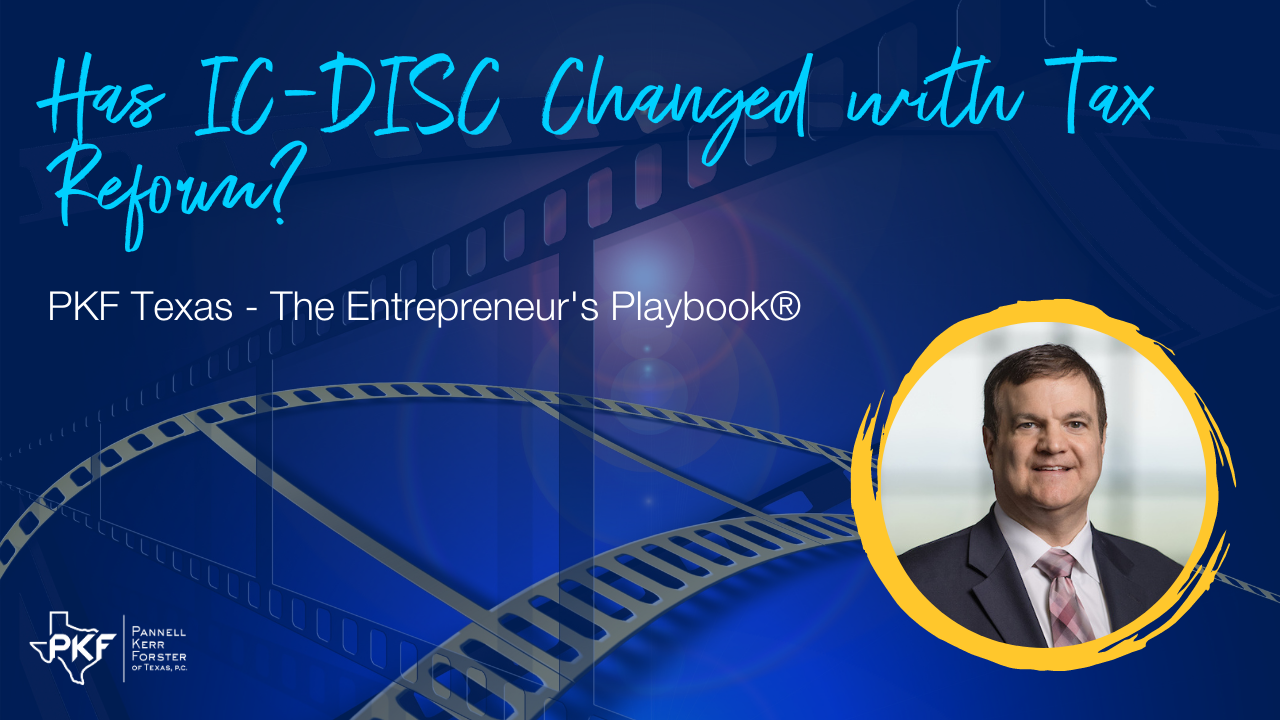Has IC-DISC Changed with Tax Reform?

Many events have happened since we last talked about IC-DISC. Is your business utilizing it? If you’re a middle market company, here is what you need to know from PKF Texas International Tax Director, Frank Landreneau, CPA, in this PKF Texas – The Entrepreneur’s Playbook® episode.
Frank: FDII is only for regular domestic corporations. So, a lot of our customers and clients don’t necessarily are able to take advantage of FDII. So, IC-DISC is very advantageous.
Jen: This is the PKF Texas – Entrepreneur’s Playbook®. I’m Jen Lemanski. I’m back once again with Frank Landreneau, one of our Approachable Advisors™ and one of the directors in our international tax practice. Frank, welcome back to the Playbook.
Frank: Well, thanks, Jen. It’s a pleasure to be here.
Revisiting IC-DISC
Jen: So, a while back, and it’s been a minute, we talked about the export incentive IC-DISC and several things have happened since the last time we talked about it. How has tax reform impacted the use of that with various companies?
Frank: It’s a good question because a lot of people think because of tax reform that happened on the Trump administration, that this incentive may not be as powerful as it was before. It’s still around. We call it the kind of the cockroach of tax strategies and incentives because It never dies. It’s been around since the 1970s and it’s just as useful today as it was back in the past.
How It Can Help
Jen: That sounds great. Now, how can it help companies if they’re… is it only exporters? How can it help them?
Frank: The traditional strategy for middle market companies is rather than creating a new business structure, you do have to create a separate entity. But you could use it as a commission DISC. And so, the traditional strategy is to take advantage of the rate arbitrage. So, it’s really essentially the IC-DISC is an export company and arranges the terms of the sale. And it converts income that’s normally taxed at ordinary income rates. Now, for entrepreneurs, that’s 37%, more or less; that’s the individual rate versus a capital gains rate, which is now 23.8%.
Jen: Okay. And are there any other incentives that exporters might consider other than IC-DISC? I know FDII is one. I’m sure there’s others with tax reform. Has that changed anything?
Frank: Yeah, so you can actually, in some cases, take advantage of both. So FDII is the Foreign Derived Intangible Income, and it provides incentives for taxpayers to export or provide services as well at like a 13.125% tax rate. The only issue is that a lot of our middle market businesses do business as a flow-through entity.
FDII is only for regular domestic corporations. So, a lot of our customers and clients don’t necessarily are able to take advantage of FDII. So, IC-DISC is very advantageous. Also, with IC-DISC, you can kind of do transaction by transaction analysis that’s not allowed under the FDII rules.
Jen: So, there’s definitely some different options to look at, and I think we’ll want them to call you to get all their options laid out on the table for them.
Frank: I feel if you’re exporting and you don’t have to be this large company, if you are doing some kind of export activity, you should at least look at putting in place the IC-DISC.
Jen: Perfect. Well Frank, we’ll get you back to talk about some more international topics. Sound good?
Frank: That sounds great. I would love to do it.
Jen: This has been another Thought Leader production brought to you by PKF Texas – The Entrepreneur’s Playbook®. For more information about this and other international topics, visit pkftexas.com/blog/. Tune in next week for another chapter.

